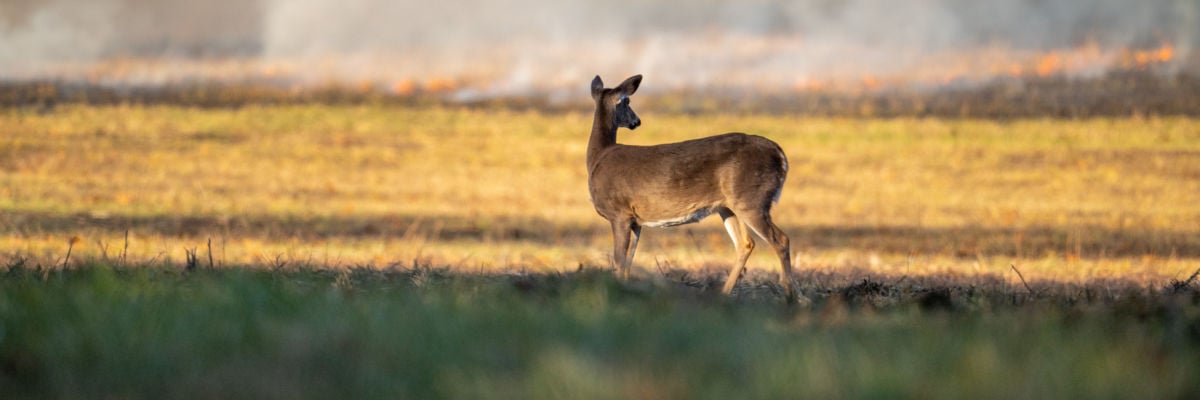
In debates with Christians, atheists commonly raise the problem of evil. They aim to show that evil and suffering count against the existence of a perfectly good and all-powerful God. Some point to animal suffering as an example of such evil.
One such argument points to apparently gratuitous suffering, such as a fawn that burns to death in a forest fire. Because there are probably no good reasons to allow this particular evil, the atheist says, we have evidence God does not exist.
A second argument cites millions of years of animals languishing and going extinct prior to human existence, which seems hard to reconcile with the existence of God—but is not surprising if God does not exist.
So, says the atheist, animal suffering gives evidence for atheism over theism. Let us survey three Catholic responses to such arguments.
At the outset, we must distinguish logical versions of the problem of evil from evidential versions. Logical versions aim to show that evil makes it impossible for God to exist, whereas evidential versions use evil as evidence that God doesn’t exist. The latter make God’s existence unlikely, or less likely, but not impossible. Arguments from animal suffering are evidential.
Furthermore, we note that the Magisterium does not require a particular position. But we will consider responses based on (1) our limited view of reality, (2) a traditional Thomistic approach, and (3) some more recent Catholic scholarship.
First, we must admit that we can’t see the whole picture. If God exists, then he transcends our finite minds in his infinite simplicity (Catechism of the Catholic Church 43). And if we have good reasons to believe in God, whether from our personal experience or the many arguments for his existence, then we also have good reasons to think that God’s ways exceed our own.
Our initial response thus takes God’s transcendence into account. God can draw good out of evil in ways we do not always understand. From our finite view of time and space, we see only a sliver of the cosmos. While on Earth, we never meet the vast majority of creatures or witness the complex connections unfolding over generations.
Yet, if God exists and is perfectly good, then we can be confident that animal pain and suffering have a place in his creation even if we do not fully understand it. The divine essence exceeds our comprehension, and so it would be more surprising if we did have all the answers. Since we cannot see all of the picture, we must acknowledge the possibility that God has reasons for various aspects of creation that go beyond our limited grasp (cf. CCC 314).
A Thomistic response might begin from the view that evil is a lack of good in something that ought to have the good by nature. For example, blindness in a human being is an evil because human beings ought to have sight, but rocks’ inability to see is not an evil. We must remember that evil is not a dark, ethereal substance permeating creation. Rather, it is a lack of goodness where it ought to be.
We can next consider with St. Thomas the nature of pain. It is, according to Thomistic author Kyle Keltz, a “passive psychological state” accompanied by an unpleasant experience, which both signals to an organism that something is wrong and motivates the organism to move away from the pain. Since it is actually a metaphysical good for animals to have a nervous system working rightly, pain is something that creatures ought to experience given their natures. So, pain is not obviously an “evil” in the sense of privation since it is a positive reality in an organism functioning properly.
Organisms would be worse off without the ability to feel pain. For example, a fawn that never felt pain would feel no urgency to hide from predators, avoid overeating, or seek shelter in dangerous weather. Keltz explains, “Unpleasant emotions might seem evil to the subject experiencing them, but these emotions are metaphysically good and ensure the survival of their subject.”
But, to return to the atheist’s challenge, what about the fawn burning to death in a forest fire? Surely, if it cannot escape, then properly functioning biology is irrelevant to its fate and its pain and suffering serve no purpose.
In response we can point out that in real-life situations it’s often not clear in a given instance whether animals can or cannot escape danger, but we can say that if they did not feel pain, they probably would not even try to escape. Furthermore, on a Thomistic view of the animal soul, animals do not experience suffering as persons with a higher level of consciousness.
A hierarchy of cognitive ability can be found in the animal kingdom, with apes, dolphins, and elephants among the most impressive non-human animals. However, even these most impressive animals do not rise to the level of “persons” in the sense of having rationality. Although animals experience some sort of pain, they lack the self-awareness and episodic memory that human beings have, which means they do not suffer as we do.
When we see an animal suffering, we have no clear access into their experience. It’s plausible that animal pain is real, biological, and functional, but also that it does not give rise to the acute misery that we can experience (and that we envisage when we project our more-complex experience of pain onto animals in an attempt to understand their experience).
Lastly, God’s goodness is an infinite metaphysical goodness, which is not the same as the moral goodness of human agents. God is pure actuality, Being itself, and not subject to duties or obligations as human beings are. This limits our ability either to predict how he will act in the world or indict him for not acting as we think he should. Moreover, God’s purposes in creation include manifesting his glory through a wide and impressive array of creatures.
On this view, it should not be surprising that a good God would will a process of millions of years of evolutionary animal floundering, punctuated with flourishing and creaturely development, reaching an apex in the creation of rational human beings. Such may be the beauty of God’s design.
Many animal lovers find Thomistic answers unsatisfying, and thus might turn to more contemporary scholars such as Trent Dougherty and Christopher Steck, S.J., who argue that God’s plan of redemption and eternal life may include non-human animals—which could place animal suffering in a new context. As the Magisterium has not weighed in on such matters, it is prudent not to place inordinate hope in such claims, but either way, the point remains that God’s ways lie far beyond our ability to understand.
Versions of the problem of evil rooted in animal suffering do not provide strong evidence for atheism over theism. They do not take into account our limitations in knowing God’s purposes, or properly nuanced understandings of evil and animal experience. Drawing upon insights from the Catechism, St. Thomas, and contemporary writers, Catholics can stand ready to give an answer to the problem of animal pain.



